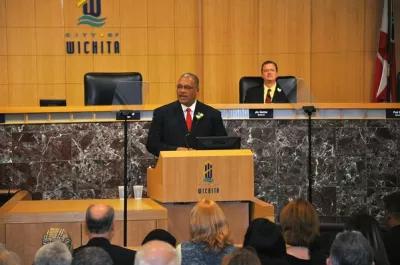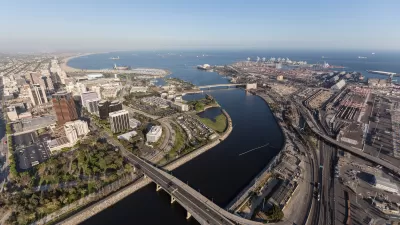Mayoral races and State of the City speeches highlight the growing political importance of local infrastructure initiatives.

Rachel Dovey calls infrastructure maintenance the new procurement reform: "a wonkish (but not unimportant) mouthful finally poised to have its day in the municipal sun." She highlights three mayoral races —in Houston, Memphis, and Philadelphia—where infrastructural concerns are key issues in the contest.
A new survey by the National League of Cities (NLC) supports her claim. With a sample of 100 State of the City speeches representing cities of regional and population differences in equal shares the survey indicates that infrastructural concerns were among the most frequently cited topics in 2015 mayoral addresses.
While economic development was the most frequently cited concern across the nation, infrastructure was a recurring theme with increased exposure from the previous year's addresses. Last year, the topic "transportation" ranked 5th overall, in terms of the percentage of mayors who devoted significant coverage* to the issue. This year, the topic area was expanded to include more broadly "infrastructure," and it ranked second overall.
By region, the percentage of mayors who gave it significant coverage was highest in the Midwest and lowest in the South.
Midwest—68% (#2)
West—64% (#2)
Northeast—52% (#5)
South—44% (#3)
Mid-size cities were most likely to devote speech time to infrastructural concerns.
<50,000 —52% (#2)
50-99,999—68% (#2)
100-299,999—52% (#3)
300,000 + —56% (#3)
Issues within the broad area of infrastructure varied.
Roads—54%
Drinking Water—52%
Sewers—34%
Bikes—32%
Infrastructure Funding—27%
Several mayors from the Southeast are quoted in the report discussing the need for expansion of internet access. Bike networks are getting coverage, as Dovey reports, in places such as Memphis. And the Salt Lake City Mayor Ralph Becker said "he would continue to fight for expanded train service and for trains to run more frequently and for longer hours, both for environmental and fairness purposes," according to the NLC report.
Investing in infrastructure isn’t a project or temporary initiative; it means creating a platform on which to build the future success of our community," said Mayor Stephanie Miller of Syracuse, NY, a city recently ranked as having the nation's highest concentration of racially segregated poverty.
While the majority of speeches covering economic development focused on job creation, 42 percent also highlighted the need for downtown development. Furthermore, 28 percent of addresses included significant coverage of housing issues. Mayor Joseph Curtatone, mayor of Vision Zero-geared Somerville, Massachusetts, said "that the effort to increase affordable housing was essential so that 'our working middle-class is not squeezed out of the city,' and highlighted a new zoning code which he said has some of the most 'ambitious inclusionary housing requirements in the nation."
*The NLC survey sample included 100 cities of every size and region for which the transcript of the Mayor's speech is available online. "A speech was considered to cover a topic if the Mayor specifically discussed the topic as relevant to city operations and the budget going forward." A topic was considered to have significant coverage if the "Mayor dedicated at least three full paragraphs exclusively to the topic (or a roughly equivalent portion of text) and articulated issues relating to the topic in detail."
FULL STORY: How Infrastructure is Shaping 3 Mayoral Races for 2015

Planetizen Federal Action Tracker
A weekly monitor of how Trump’s orders and actions are impacting planners and planning in America.

Congressman Proposes Bill to Rename DC Metro “Trump Train”
The Make Autorail Great Again Act would withhold federal funding to the system until the Washington Metropolitan Area Transit Authority (WMATA), rebrands as the Washington Metropolitan Authority for Greater Access (WMAGA).

DARTSpace Platform Streamlines Dallas TOD Application Process
The Dallas transit agency hopes a shorter permitting timeline will boost transit-oriented development around rail stations.

Supreme Court Ruling in Pipeline Case Guts Federal Environmental Law
The decision limits the scope of a federal law that mandates extensive environmental impact reviews of energy, infrastructure, and transportation projects.

Texas State Bills to Defund Dallas Transit Die
DART would have seen a 30% service cut, $230M annual losses had the bills survived.

Bikeshare for the Win: Team Pedals to London Cricket Match, Beats Rivals Stuck in Traffic
While their opponents sat in gridlock, England's national cricket team hopped Lime bikes, riding to a 3-0 victory.
Urban Design for Planners 1: Software Tools
This six-course series explores essential urban design concepts using open source software and equips planners with the tools they need to participate fully in the urban design process.
Planning for Universal Design
Learn the tools for implementing Universal Design in planning regulations.
Roanoke Valley-Alleghany Regional Commission
City of Mt Shasta
City of Camden Redevelopment Agency
City of Astoria
Transportation Research & Education Center (TREC) at Portland State University
US High Speed Rail Association
City of Camden Redevelopment Agency
Municipality of Princeton (NJ)





























